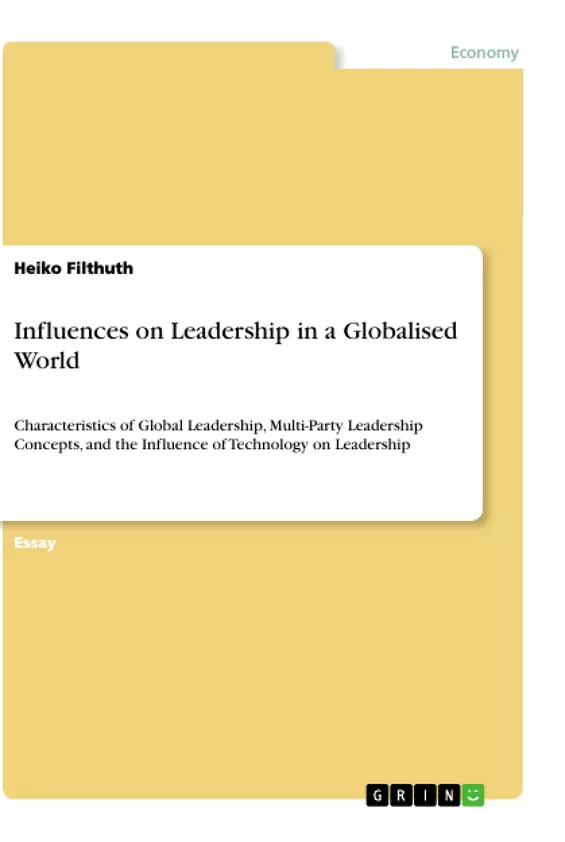Several factors can influence a successful leadership – and leadership can affect social environments and entire societies. The characteristics of leadership are thus important to be understood from their scholarly origin to their recent developments, in their multi-party-concepts and the influences they take and undergo. This essay considers in five logical steps the characteristics of global leadership, the influences of initial ideas on today’s leadership, multi-party-concepts in leadership, the influence of technology on leadership, and how leadership can foster social change.
Inhaltsverzeichnis (Table of Contents)
- Introduction
- Leadership Literature from a Today's Perspective
- The Traditional Body of Leadership Literature
- Contemporary Views on Leadership
- Salient and Antiquated Perspectives
- Leadership as a Multi-party Concept
- Organisational Structures Under Multi-party Leadership
- Characterising Leadership in the Global World
- Leadership and Globalisation
- Examples for Recent Changes in Leadership
- Conclusions
Zielsetzung und Themenschwerpunkte (Objectives and Key Themes)
This essay aims to explore the concept of leadership in the context of globalization, considering its historical development and modern manifestations. It examines the impact of traditional and contemporary leadership theories, the role of technology, and the potential of leadership to foster social change.
- Characteristics of global leadership and its influence on a globalised world
- The development and influence of traditional leadership theories
- The concept of multi-party leadership and its prevalence in organisational structures
- The impact of technology on leadership styles and its challenges
- Leadership as an agent of social change in developing economies
Zusammenfassung der Kapitel (Chapter Summaries)
The introduction provides a brief overview of leadership's importance in the globalised world, highlighting its continuous development and the changing role it plays in today's organisations. The chapter further explores the characteristics of leadership in a globalised world, discussing examples of recent changes and their effects.
The second part delves into the traditional body of leadership literature, starting with the Great Man Theory and moving through the Trait, Behavioural, and Contingency Leadership theories. It then contrasts these traditional views with contemporary perspectives, highlighting their continued relevance and identifying areas where they are less applicable in today's context.
The third part focuses on multi-party leadership, exploring its potential presence even in seemingly single-leader organisations. The author proposes a set of questions to reveal multi-party leadership at work, suggesting that the leader might not always act independently but considers input from other stakeholders.
Schlüsselwörter (Keywords)
The main focus topics of the text include leadership, globalisation, traditional and contemporary leadership theories, multi-party leadership, technology, social change, developing economies, and the impact of leadership on society and organisations.
Frequently Asked Questions
What characterizes leadership in a globalized world?
Global leadership requires the ability to navigate complex, multi-cultural environments, adapt to rapid technological changes, and manage diverse stakeholder interests across borders.
How do traditional leadership theories differ from contemporary views?
Traditional theories (like the Great Man or Trait theories) focused on innate qualities of a leader, while contemporary views emphasize behavioral flexibility, situational context, and shared leadership concepts.
What is multi-party leadership?
Multi-party leadership suggests that leading is not the act of a single individual but a collaborative process involving various stakeholders and organizational levels working together.
How does technology influence modern leadership?
Technology enables remote leadership and faster communication but also demands new skills in managing digital information and maintaining social cohesion in virtual teams.
Can leadership foster social change?
Yes, effective leadership can act as a catalyst for social change, especially in developing economies, by promoting innovation, ethical standards, and sustainable growth.
- Citation du texte
- Heiko Filthuth (Auteur), 2019, Influences on Leadership in a Globalised World, Munich, GRIN Verlag, https://www.grin.com/document/541351



